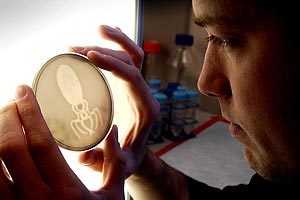Synthetic biology portends big changes in our lives by ushering in a dizzying array of applications in everything from medicine to biofuels, environmental remediation to agriculture. Though many of these applications haven’t yet come on line, researchers are hard at work to synthesize new drugs and devices made from genetic parts.
For example, there’s an enzyme that exists in plants which makes methyl halides, a molecule which can be catalytically converted into gasoline and other chemicals. Imagine if you could put this enzyme-making gene into yeast, then you could brew the yeast to churn out the methyl halides and after some optimization of the production pathway, you could scale up production to pump out this carbon neutral gasoline precursor for use in today’s automobiles. This is the idea behind an innovative biofuels project that has taken off in the lab of Chris Voigt at UCSF’s School of Pharmacy.

Voigt and his team surveyed the genetic database for the presence of the gene that encodes for the enzyme that makes methyl halides. Lo and behold, the gene exists in plants as diverse as ice plant, which dots the northern California coast, bok choy and pinot noir grapes. After building a library of about 100 enzymes from these diverse plants, the researchers had to determine which of these would function best in the yeast. They zeroed in on an enzyme from ice plant and then used the tool of DNA synthesis to translate the gene for the enzyme that makes methyl halides into something that would work in yeast.
The remarkable thing about this project is that the researchers never actually touched any of the plants. They simply “Googled” a genetic database to find all the genes out there in plants that produce the enzyme that makes methyl halides. As Professor Voigt says, “it’s incredible that synthetic biology is something that could really unlock the potential of using organisms in order to produce fuels.”